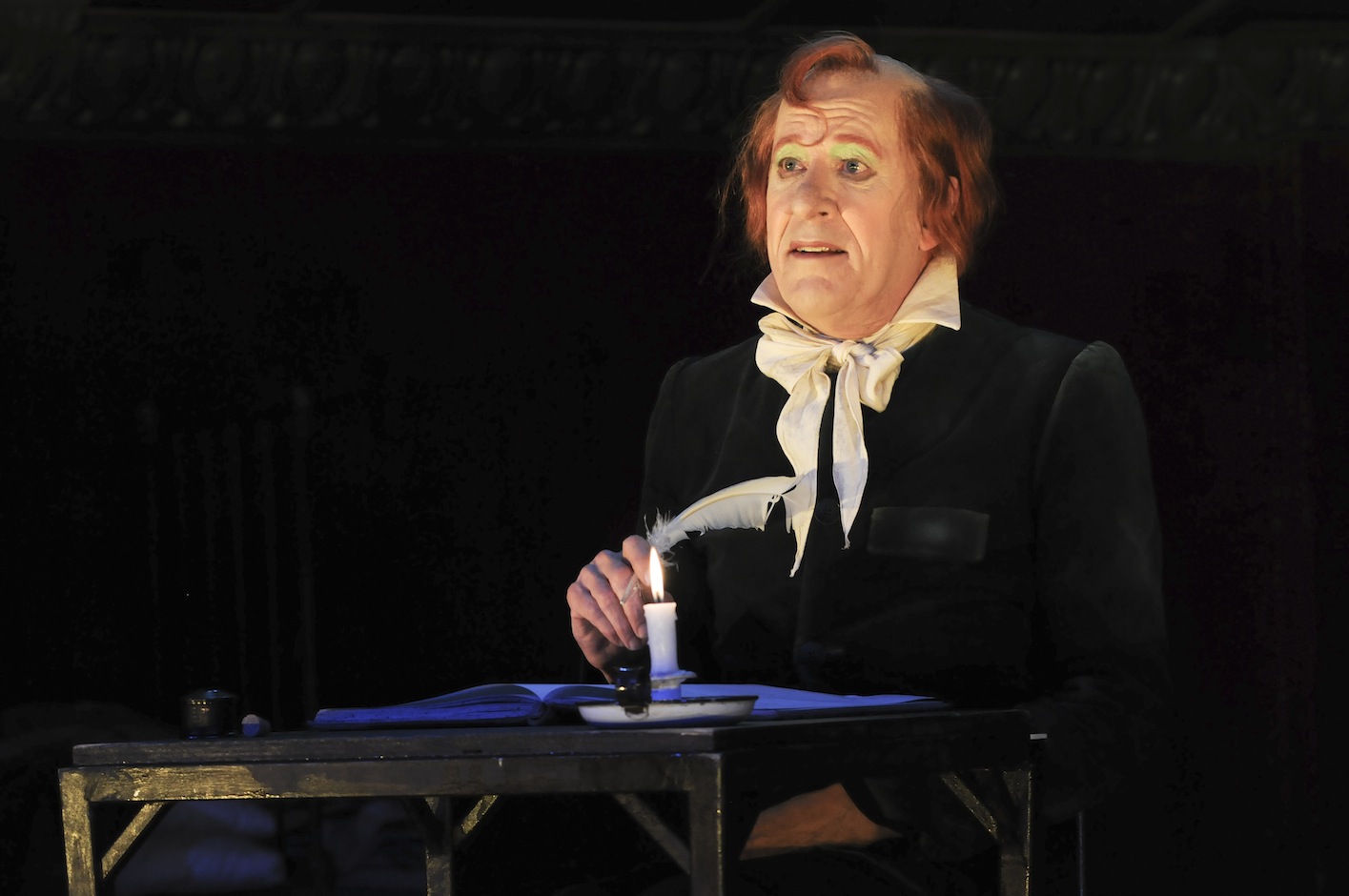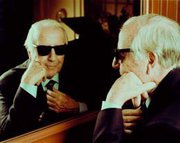In today’s Wall Street Journal I review two shows, The Diary of a Madman at Brooklyn’s BAM Harvey Theater and Shhhh! at Garden Theatre in Winter Garden, Florida. Here’s an excerpt.
* * *
 Everyone knows what Geoffrey Rush has been up to lately, but when he’s not giving Oscar-nominated performances in movies about stuttering kings, he can frequently be seen on the stage. His first such appearance in New York, in the 2009 Broadway revival of Eugène Ionesco’s “Exit the King,” won him a Tony. Now he’s back in town, playing another man at the end of his rope. “The Diary of a Madman” is David Holman’s stage version of Nikolai Gogol’s 1835 short story about an obscure civil servant who goes mad and proclaims himself to be the King of Spain. No one will be surprised to hear that Mr. Rush, who won an Oscar playing a schizophrenic in “Shine,” gives a spectacularly flamboyant performance as Poprishchin, a Clerk of the Ninth Grade who spends his days trimming quill pens and dreaming of glory. But in spite of all the excitement that Mr. Rush is stirring up at the BAM Harvey Theater, I can’t say that I found “The Diary of a Madman” to be convincing, much less moving.
Everyone knows what Geoffrey Rush has been up to lately, but when he’s not giving Oscar-nominated performances in movies about stuttering kings, he can frequently be seen on the stage. His first such appearance in New York, in the 2009 Broadway revival of Eugène Ionesco’s “Exit the King,” won him a Tony. Now he’s back in town, playing another man at the end of his rope. “The Diary of a Madman” is David Holman’s stage version of Nikolai Gogol’s 1835 short story about an obscure civil servant who goes mad and proclaims himself to be the King of Spain. No one will be surprised to hear that Mr. Rush, who won an Oscar playing a schizophrenic in “Shine,” gives a spectacularly flamboyant performance as Poprishchin, a Clerk of the Ninth Grade who spends his days trimming quill pens and dreaming of glory. But in spite of all the excitement that Mr. Rush is stirring up at the BAM Harvey Theater, I can’t say that I found “The Diary of a Madman” to be convincing, much less moving.
Part of what’s wrong with this production, which has been staged to the hilt and back again by Neil Armfield, the director of “Exit the King,” is its underlying premise. Gogol’s story, a monologue in which we behold madness bursting into flower, is a masterpiece of dramatic economy. Not one of its eight thousand words is wasted. To present it on the stage, all you have to do is read it out loud in a setting of the utmost simplicity, letting the text do the work. Mr. Holman’s adaptation, on the other hand, erects a massive, self-consciously theatrical superstructure on top of the story…Mr. Rush is made up to look like a decayed, eye-shadowed dandy in a tattered velvet suit. Nothing is left to the imagination: All of Gogol’s effects are spelled out with the utmost explicitness.
The same is true of Mr. Rush’s frenetic performance, which is a tour de force in both the best and worst senses of the phrase. He flutters around like a demented marionette, embroidering every line with brilliantly ingenious tricks at which you cannot help but gape admiringly–but which distract you from Poprishchin’s desperate plight….
Farce usually relies on a mixture of high-speed dialogue and high-energy physical action, but PB&J Theatre Factory, a company of Florida actors who write their own material, has pulled a switch on the classic formula in “Shhhh!” In this four-door farce, a pair of Laurel-and-Hardyesque jewel thieves who are on the lam hide out in a rundown hotel that looks empty but turns out to be fully occupied with a diverse collection of peculiar people. What makes “Shhhh!” so fresh is that there’s no dialogue: The characters emit cries of pain and horror and utter isolated words here and there, but beyond that, nobody says anything. The comedy is entirely physical and enormously clever…
* * *
Read the whole thing here.
Archives for February 18, 2011
TT: Good and popular
 Today’s Wall Street Journal “Sightings” column is a tribute to George Shearing. Here’s an excerpt.
Today’s Wall Street Journal “Sightings” column is a tribute to George Shearing. Here’s an excerpt.
* * *
George Shearing, who died on Monday, was a great jazz pianist. For much of his long lifetime, he was also one of the 20th century’s most successful entertainers, a purveyor of super-smooth easy-listening music that was distinguishable from Muzak only because he played it with perfect taste. That was part of what made him so admirable an artist: Even when he was making music for the masses, he did it without a hint of condescension.
Mr. Shearing, who was born in England in 1919, started out as a standard-issue swing-era piano player. Then he moved to the U.S. in 1947, heard what the boppers were doing on 52nd Street, and decided to do likewise. Blessed with an ear sharp enough to hear a gnat shrug, he easily mastered bop’s complex vocabulary, but decided that it was too abrasive to give pleasure to ordinary listeners. In 1949 he put together a quintet with an offbeat instrumentation–piano, vibraphone, guitar, bass and drums–that played everything from pretty-pretty ballads to such hell-for-leather bebop anthems as Denzil Best’s “Move.” He kept the textures light and the solos concise, and the public, not surprisingly, loved what it heard. “September in the Rain,” the quintet’s first single, sold nearly a million copies….
Mr. Shearing’s willingness to work both sides of the street vexed jazz critics, who are not an especially tolerant lot, and by the ’60s he had been written off as a popularizer. In fact, though, he was something completely different, a dead-serious artist who enjoyed playing well-crafted music that was accessible to a popular audience. One of my favorite Shearing records is a quintet-plus-strings performance of “Early Autumn” from a 1961 album called, believe it or not, “Satin Affair.” Yes, it’s elevator music–but if you don’t respond to its elegance, then you’re not paying attention….
* * *
Read the whole thing here.
TT: Almanac
“One of the most time-consuming things is to have an enemy.”
E.B. White, “A Report in January”
